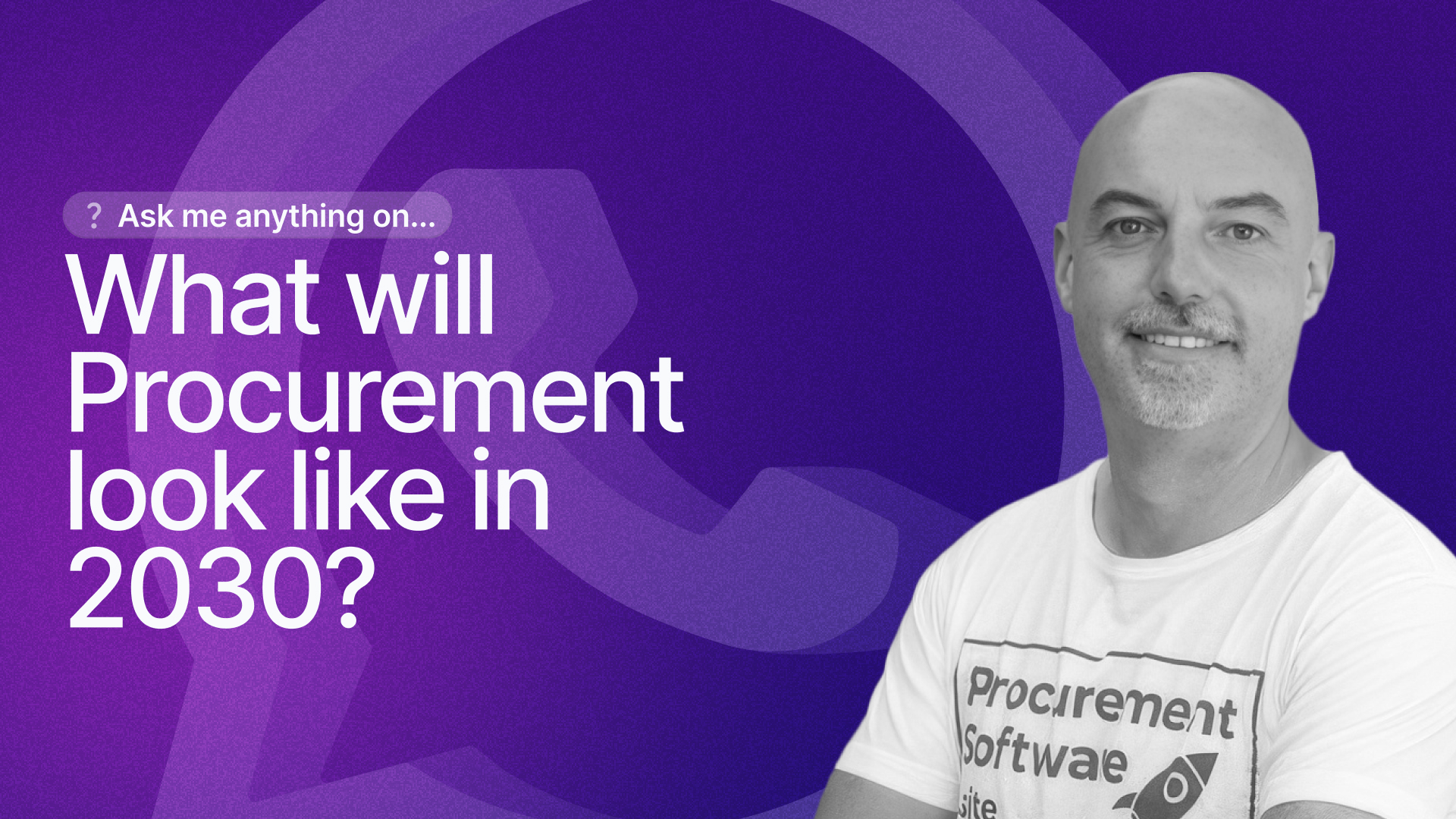Procurement 2030: the future is closer than you think

Take a self-guided tour of the platform.
Join our Procurement Leaders WhatsApp Community
See why Vertice is trusted by top procurement leaders.
Connect with a trusted network of procurement leaders who are collaborating, sharing ideas, and growing their impact together.
Procurement is changing fast, and the changes coming by 2030 will completely reshape how we work, what skills we need, and how we add value.
In a recent Ask Me Anything session in the Vertice WhatsApp Community for Procurement Leaders, James Meads - procurement tech expert and host of the Procurement Software podcast - shared his thoughts on what procurement teams will look like in just five years.
Here are the key insights that every procurement leader should be thinking about today.
Category specialists are going to change, big time
One of James's boldest predictions is that traditional category management roles are in for a major shake-up. The deep category specialists who are really valued today - those with 10-15 years of experience in one specific area - will see their roles change completely.
"If you think about just the level of research that something like Perplexity Labs can do for something like $20 a month, then you're getting 80% of an analyst level report through an AI tool," James says. This doesn't mean expertise becomes worthless, but rather that deep specialists will likely become freelance consultants, moving from project to project rather than being permanent employees.
What replaces them?
Generalists who can orchestrate across categories, manage supplier relationships holistically, and use AI tools effectively. The future procurement professional will need to be comfortable with ambiguity and able to work across traditional silos.

From rule enforcers to value creators
The old view of procurement as the "internal policeman" focused on compliance and cutting costs is quickly becoming outdated. James sees a future where procurement moves way beyond this traditional role to become real value creators.
"Procurement is going to be much more involved in top line, revenue and growth, as well as bottom line cost savings," he said. This shift is possible because AI will automate much of the routine compliance work - all that box-ticking and process-following that takes up so much time right now.
The secret to making this work? Getting better at communication.
James pointed out that sales teams are great at showing off their wins internally, while procurement has always been pretty bad at this. As AI frees up time from the day-to-day stuff, procurement teams that can clearly show their value will see huge benefits.
.jpeg)
How to prepare for this future: what you can do right now
For procurement people wondering how to get ready for these changes, James gave practical advice that goes way beyond just learning to use ChatGPT:
Get curious: You don't need to become an expert in everything, but knowing more than most people about a topic puts you way ahead of the game.
Get better at presenting: Being able to engage your audience and present well to the business will be really important. This includes getting comfortable talking on camera and recording videos.
Learn some basic automation: Tools like Zapier aren't that complicated, but most procurement people aren't using them. Watch a few YouTube videos or take a simple course and you'll be ahead of most others.
Learn how to work with AI: As James put it, "a lot of people in procurement are hoping this is a fad that is going away. They're not."
The talent problem we're heading for
Maybe the most worrying thing James talked about was the talent shortage coming our way.
As procurement tries to hire more tech-savvy people, they might struggle to find candidates who have both traditional procurement knowledge and the entrepreneurial, quick-thinking approach the future needs.
"A lot of procurement pros have been trained to become essentially process and compliance robots," James said. The industry needs people who can think creatively, learn from failures quickly, and adapt fast - skills that traditional procurement training doesn't always develop.
Also, as AI takes over entry-level work, it gets harder for new graduates to break into procurement, which could create a real problem with bringing new people into the profession.
.jpeg)
Technology: getting better but still behind
While procurement technology is still way behind sales and marketing tools when it comes to investment and features, James sees the knowledge gap between buyers and sellers getting smaller. AI makes it much easier to access market data, commodity information, and analysis that used to be hard to get.
But procurement leaders shouldn't expect the investment gap to disappear completely. With thousands of sales and marketing tools compared to around 420 procurement tech solutions, that difference will probably stick around.
Building tomorrow's team today
For leaders taking over procurement teams, James suggests starting with a skills check: figure out where your team is now versus where they need to be for 2030. Some team members will be able to make the change; others might not have the right mindset or skills for what's coming.
The tough reality is that this needs to happen sooner rather than later, as things are changing faster and faster.
What this all means
The procurement team of 2030 will be smaller, much more tech-savvy, and way more strategic than today's teams.
Success will go to those who start getting ready now - not just by using new tools, but by completely rethinking how procurement creates value and shows it to the rest of the business.
The future of procurement isn't just about being more efficient or managing risk better. It's about doing both, led by people who can think strategically, communicate clearly, and use technology to multiply what they can achieve.
These insights came from a recent Ask Me Anything session in the Vertice WhatsApp Community for Procurement Leaders, where James Meads regularly shares his expertise with fellow procurement professionals. The community provides a space for procurement leaders to connect, share experiences, and learn from each other in an informal, accessible format.
Interested in joining the conversation? The Vertice WhatsApp Community brings together procurement leaders from around the world to discuss the challenges, opportunities, and innovations shaping our profession.
You can register your interest in joining here.
.webp)



.jpeg)
.jpeg)
.webp)